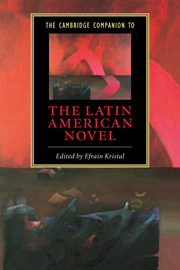5 - The Brazilian novel
from Part II - Heterogeneity
Published online by Cambridge University Press: 28 May 2006
Summary
The development of the Brazilian novel is inseparable from ethnic and geographic considerations. The Brazilian nation grew from the interaction and miscegenation of European, indigenous, and African populations in five distinct regions according to an enduring paradigm which has informed political and cultural discussions: the Northeast, originally a plantation society like the US “South,” and a privileged storehouse of living traditions; the socioeconomically dominant Southeast, including the states of Rio and São Paulo and Minas Gerais; the predominantly indigenous North (essentially, the Amazon basin); the South, where settlement was principally European; and the frontier lands of the Center-West, less populated and relatively peripheral to national power. After Brazilian independence from Portugal in 1822, Rio de Janeiro quickly developed a European-style bourgeois cultural life, including numerous newspapers, in which most nineteenth-century novels were initially published in serial.
Joaquim Manuel de Macedo’s A moreninha (“The little brunette,” 1844) was perhaps the first successful novel in Brazil and inaugurates a recurrent nineteenth-century theme: a romantic relationship between idealistic young people in spite of cruelties of social fortune. The first notable work of realism focusing on the urban lower-middle class is Manuel Antônio de Almeida’s Memórias de um sargento de milícias (“Memoirs of a constable,” 1854), which presents a series of picaresque but touching scenes, and evokes the transformation of a town into a city with suggestive nostalgia. Romantic and realist modes both flourished through the late nineteenth century and often overlapped within works.
- Type
- Chapter
- Information
- The Cambridge Companion to the Latin American Novel , pp. 105 - 124Publisher: Cambridge University PressPrint publication year: 2005



